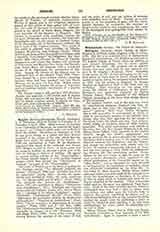

Bergier, NICOLAS-SYLVESTRE, French theologian, b. December 31, 1715 at Darney in Lorraine; d. at Versailles, April 9, 1790. After a course of theology in the University of Besancon, he received the degree of doctor, was ordained priest, and went to Paris to finish his studies. Returning to Besancon in 1748, he was given charge of a parish and later became president of the college of the city, which had formerly been under the direction of the Jesuits. In 1769 the Archbishop of Paris, M. de Beaumont, appointed him canon of the cathedral, and thenceforth Bergier resided at Paris. A pious priest and an energetic student, he devoted a great part of his time to writing in defense of religion. He agreed to correct certain articles of the “Encyclopedie”, but found himself obliged to write entirely original articles which then formed the “Dictionnaire de theologie” as a part of the “Encyclopedie”.
The works of Bergier are in the fields of apologetics and theology, except “Les elements primitifs des langues” (Besancon, 1764) and “L’origine des dieux du paganisme” (Paris, 1767). Among his apologetical and theological works, the most important are: “Le deisme refute par lui-meme” (Paris, 1765); “La certitude des preuves du christianisme” (Paris, 1767, also published in Migne’s “Demonstrations evangeliques”, XI); “Reponses aux Conseils raisonnables de Voltaire” (Paris, 1771, also in Migne, ibid.); “Apologie de la religion chretienne”—against d’Holbach’s “Christianisme devoile” (Paris, 1769); “Refutation des principaux articles du dictionnaire philosophique”; “Examen du materialisme” (Paris, 1771); “Traite historique et dogmatique de la vraie religion” (Paris, 1780, and 8 vols. 8vo., 1820). The “Dictionnaire theologique” has been often edited, especially by Gousset in 8 vols. (Besancon, 1838) and Migne (Paris, 1850). Some of his writings concerning divorce, the question of the mercy of God, and the origin of evil, and one volume of sermons were published after his death. Though on certain points, as on the questions of grace and the super-natural necessity of revelation, the doctrine of Bergier lacks precision and completeness, the value of his theological and apologetical work cannot be denied.
G. M. SAUVAGE

